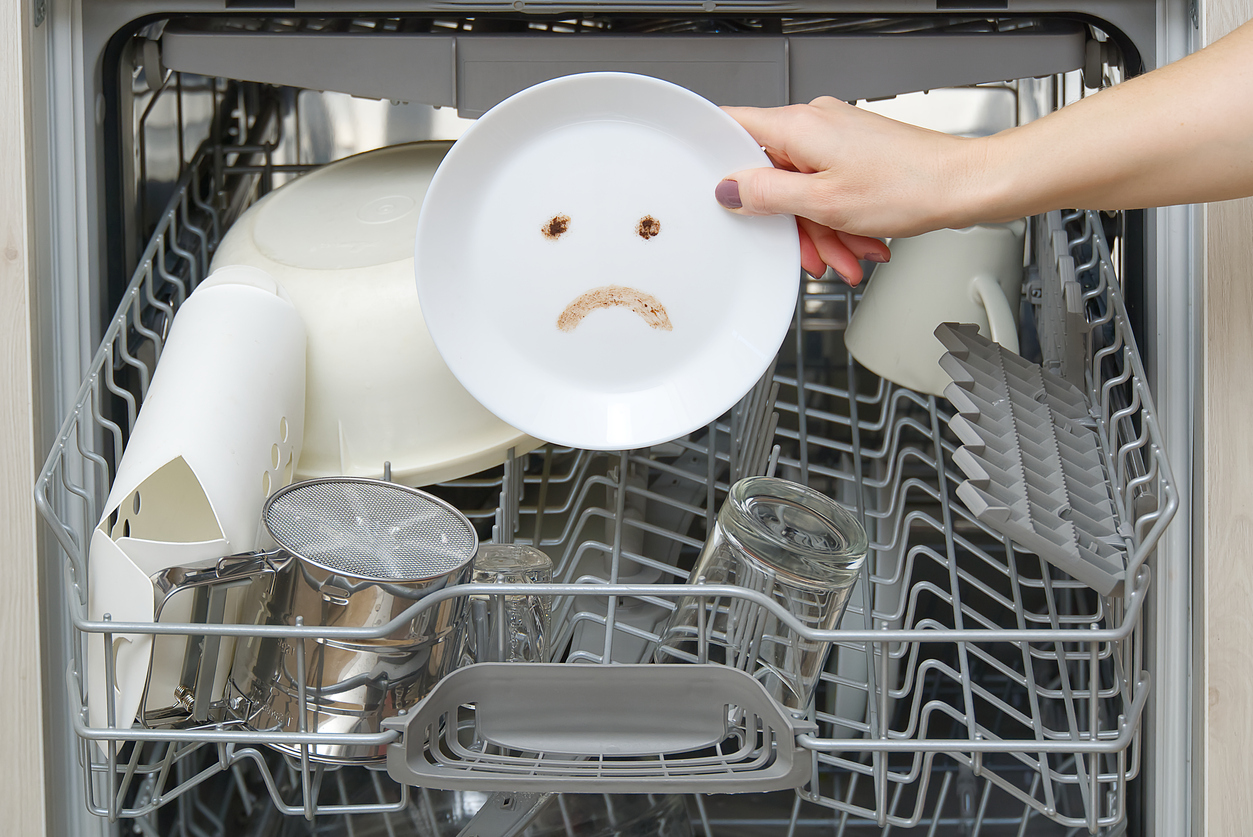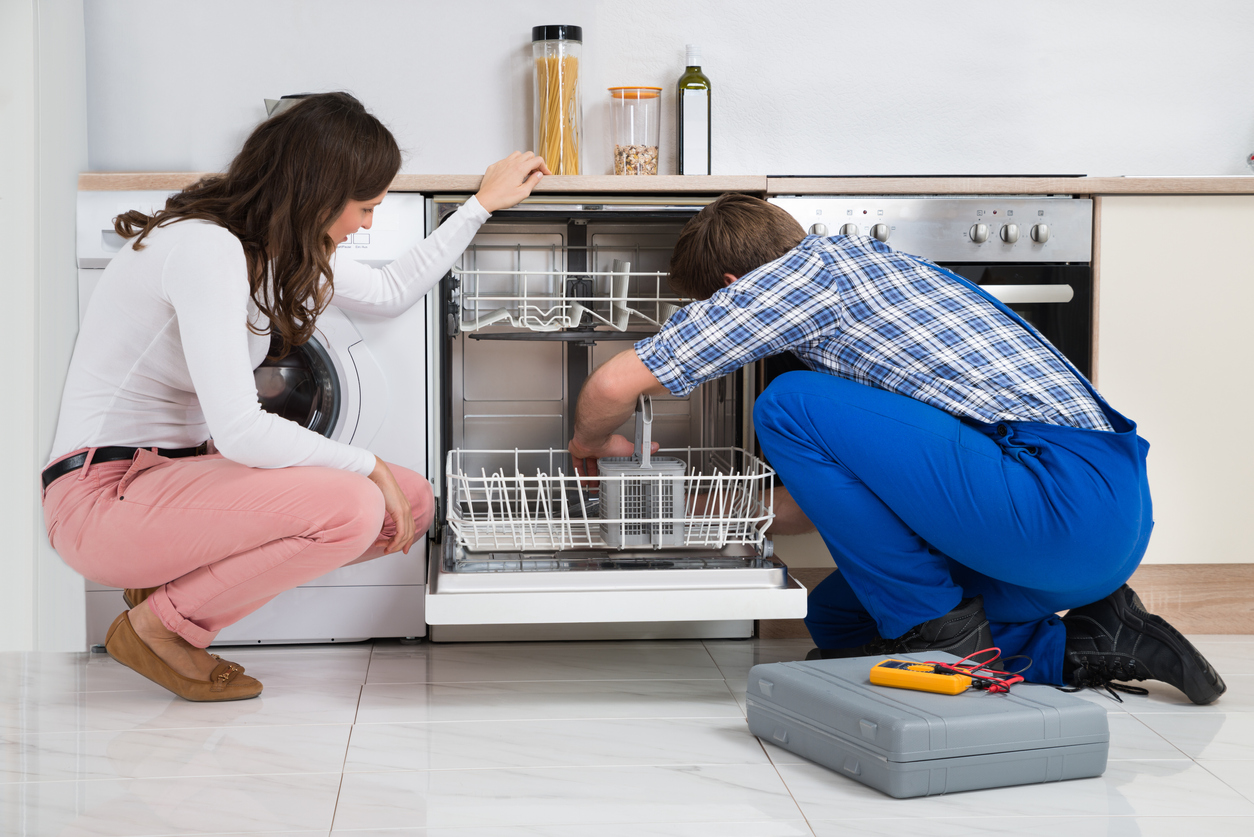Have you wondered, “Why is my dishwasher not cleaning?” Whether you want to learn how to fix cloudy glasses from the dishwasher or get rid of stubborn splotches on your plates, the bottom line is that your dishwasher is not cleaning dishes. Thankfully, your friends in the business know the 13 best ways to make your dishwasher work better, and lucky for you, we are eager to share our knowledge. But best of all, these tips are all very easy to troubleshoot!
Is Your Dishwasher Not Cleaning Well?
Whether you have a new dishwasher or one that has been in use for some time, getting the dishwasher to clean better is quick and easy if you know what to do. Modern dishwashers are made differently than before. Once you know the differences, you can make a couple of small changes and your dishes will come out sparkling clean.
Whether you have a Bosch, GE, Maytag, Whirlpool, KitchenAid, or any other name-brand dishwasher, these tips will make your appliance run better and last longer, ultimately giving you the best performance when washing your dishes.

Things You Can Do with a New Dishwasher
If your dishwasher is brand-new, you can use these next tips to get better results from your dishwasher, and most of them won’t cost you a penny. Modern dishwashers use far less water and energy than before, although they take longer to wash. Knowing how modern dishwashers work, you can make a few small changes that will have a big impact on the way your dishes come out after a wash, including:
- Pre-heat the water
- Rinse off excess food residue
- Load the dishes properly
- Use the best dishwasher soap
- Use the soap dispenser
- Use the proper cycle for the load
- Use a longer and hotter cycle
- Install a water softener or whole-house water filter
1. Pre-Heat the Water
The first and best tip for getting your dishwasher to wash dishes better is to pre-heat the water. There are a few things that must be right for a dishwasher to perform the best, and using hot water is right at the top of the list.
Newer dishwashers use only a few gallons of water to run the cycle. In most houses, this means the water never has time to warm up before the machine gets the few gallons it needs to run. Instead of washing with room temperature water, run your kitchen sink until the water coming out of the tap is as hot as it can get. Then, turn on the dishwasher. This ensures that only very hot water enters the dishwasher, which helps your soap work better and lifts debris off your dishes more easily.
2. Knock Off Excess Food
While you should not have to do your dishes by hand before doing your dishes in the dishwasher, you do need to clean them at least a little before loading your machine. Dishwashers are designed to clean your dishes, but they aren’t designed to dispose of large particles of food. Again, newer appliances use less water, and that means large pieces of food debris float around in that water until the cycle is done. The easiest way to get rid of the excess food without it seeming like a chore is to lightly rinse your dishes and scrape the food off while you are waiting for the sink water to heat up from the first tip. Usually, this is enough time to prep the dishes for the cycle, and you should heat up the water anyway.
3. Load the Dishes Properly
Once you’ve ensured there are no pieces of food left on the dishes, it’s time to load your machine. Remember: Just because it fits, doesn’t mean it will wash well. Each machine is designed to work the best when loaded the way that the manufacturer recommends. Check your manual and follow its instructions. They may be different than you are used to when it comes to loading your old machine, but the way you arrange your dishes makes a difference in how the machine washes.
Following the directions in the manual, you can ensure that everything is facing the right way to get the most from the sprayers and detergent inside the dishwasher. Also, don’t stuff the dishwasher too tightly. You need to have gaps between the dishes for the machine to work well. When plates or cups touch each other, it’s hard for the spray arms to get between them.
4. Use the Best Dishwasher Soap
Another thing you can do is ditch the cheap dish soap, and use soap made specifically for your dishwasher. Both solutions make a big difference, and your dishwasher will clean better. Firstly, soaps have changed a lot over the years, and the properties that make soap work well have been removed due to changes in the law. What’s left is just enough to get the job done, but if you buy bottom-shelf soap, you may not actually save any money in the long run.
When using poor-quality soap, you will likely have to run the dishwasher a couple of times to get your dishes clean, and that means twice as much soap for one load. In the end, the price difference is not worth it when you are forced to use twice as much. Also, make sure not to use any soap that is not designed for the dishwasher. Since dishwashers clean differently than washing by hand, using kitchen sink soap will not work as well, and in fact, it can cause a film buildup that leads to a dirty tub, grimy racks, and possibly even make your dishwasher overflow into your beautiful kitchen!
5. Use the Soap Dispenser
Most dishwashers have a soap dispenser that is built into the door. These are made to dispense the perfect amount of soap, at just the right time to get your dishes clean. It’s one way to make your dishwasher clean better but only if you use it.
No matter how you may have done your dishes before, don’t just throw the soap into the machine. If your machine has a dispenser, fill it with the right amount of soap. (This is generally much less soap than you’d expect, especially if you have soft water.) Then, let it dispense at the programmed time. Also, don’t top off the soap or add more directly on the dishes. Using an excessive amount of soap has the opposite effect—not only does it work less effectively, but it also creates residue inside the machine. Over time, this residue builds up, and your dishwasher water will always be a little dirty from all the gunk stuck inside the tub and on the racks.
6. Use the Proper Cycle for the Load
The load selector on your dishwasher is important. Different types of loads require different wash actions. Your dishwasher is smart enough to wash pots and pans differently than stemware—all you have to do is pick the right cycle. A little time spent picking out the right cycle for the load of dishes you are washing will make a difference in how well your dishwasher works. Using the right washing type, your dishes will come out cleaner, and with less residue. Most dishwashers have a handful of cycle choices, and if yours does, it will be easy to know which one you should use. When in doubt, refer to the manual.
7. Use a Longer and Hotter Cycle
If you are still seeing stuck-on debris on your dishes even when using the proper cycle, switching to a longer and hotter cycle will typically help. Since dishwashers don’t use as much water anymore, they are forced to recycle the same water for the entire wash program, but when you extend that cycle and heat the water up more, you give the dishwasher more time and power to get the job done. Simply select a longer cycle than you normally do, and make sure that you are using the temperature-boosting features. Although all appliances are different, you should be able to tell how to raise the water temperature by studying the buttons and the user’s manual.
8. Install a Water Softener of Whole House Filter
If you live in a place with very hard water, it can be extra difficult to get your dishes clean. Soaps just have a difficult time working in hard water, and for the most immaculate looking dishes possible, you should think about getting a water softener or whole-house water filter. Water softeners and whole-house water filters are very important in states like Arizona, where the water is much harder than elsewhere in the country. Not only does this affect your appliances, but it also causes buildup in your pipes as well as your faucets and fixtures.
Removing the hardness or filtering it out of your household water will make your dishwasher clean better than it ever has before. The soaps will work better, the rinsing agent will remove more spots, and the dishes will even dry better.
Spencer’s TV & Appliance sells both Water Softeners and Whole-House Water Filters, and your salesperson can help you with both.
Related: How to Treat Hard Water in Arizona’s Desert Climate
Related: Top 5 Benefits of a Water Softener

Things to Check with a Dishwasher You Already Have
Next, if you already have a dishwasher that has been in use for a while, and the dishes are just not coming out as clean as they used to, there are a few things you can do to help. You should start with the tips that we already covered for new dishwashers, but if you are doing all of those and still need a little boost, these will help too:
- Clean inside the dishwasher
- Make sure the drain is not clogged
- Clean the dishwasher trap
- Clean the dishwasher door seal
- Install a water softener
9. Clean Inside the Dishwasher
Even though your dishwasher’s primary job is cleaning dishes (and cleans itself to an extent every time you run a wash cycle), your dishwasher will still build up some debris over time. If you don’t clean your dishwasher tub when this buildup happens, the debris gets loosened up and mixes with the fresh water that you use to wash your dishes, rendering the appliance inefficient.
All you need to do is wipe down the inside of the machine and you will be able to feel the areas that need your attention right away. Then, you can run the machine while it’s empty with a dishwasher cleaning product to get the last bits of grime and food residue.
10. Make Sure the Drain is Not Clogged
Your dishwasher will use one batch of water to wash the dishes and another to rinse them. Making sure that the drain is not clogged can be the difference between using clean rinsing water and using dirty rinsing water.
You don’t even have to be a dishwasher repair technician to check your drain. All you need to do is look under the sink and find the ridged hose that connects to your disposal or sink drainpipe. When the dishwasher drains the washing water, you will hear it. Use a flashlight, and make sure that you can see water flowing through the tube well, without being obstructed or stopped. If you do see a clog, and you don’t want to tackle it yourself, you can call a repair technician to come and clean out that line or replace it with a new one. This will help your machine drain better, and that means cleaner water for rinsing your dishes.
11. Clean the Dishwasher Filter
Many dishwashers have a filter that collects the larger food particles that cannot go through the drain tubing without getting stuck. After a while, this can fill up, causing the dishwasher not to work as well and possibly even stink. While you may refer to your manual for exact directions, you should be able to remove the filter, clean it out, and re-install it quickly. The trap is designed to be checked and emptied by the consumer, so they tend to make it easy. If you find yours full, you’ve likely found the cause of the dirty dishes at the end of a wash cycle.
12. Clean the Dishwasher Door Seal
One big area of the dishwasher that most people forget to check is the door seal. This rubber gasket is designed to keep the water inside the appliance, but unfortunately, it also attracts soap residue and grime. Not only will getting rid of this gunk make your dishwasher perform better, but it will also make your dishwasher smell better.
Carefully feel around the door seal. If you feel slimy residue, or you can see food debris in the cracks and crevasses, then it’s time to clean that seal. Follow the directions in the manual, and carefully clean out that residue. This gunk gets into the wash and rinse water, causing both cycles to work less effectively.
13. Install a Water Treatment System
Finally, just as a new dishwasher can benefit from having cleaner water to wash the dishes with, your older dishwasher can benefit as well. If your dishwasher is not cleaning properly despite your best efforts, it may be that your water is to blame. The incoming water can be very hard and full of minerals in some parts of the country, including Arizona. Adding a water softener or whole house water treatment system can improve the water going into your dishwasher and improve the look of the dishes coming out.
Related: Spencer’s Fun Guide to Water Treatment Systems

Shop Dishwashers at Spencer’s
If you’re wondering where to buy a name-brand dishwasher, look no further than Spencer’s TV & Appliance! Be sure to scour our catalog of top-rated dishwashers, and if you have questions regarding how to fix a dishwasher, don’t hesitate to call or visit your friends in the business. Proud to have served our customers since 1973, we have 10 locations in the Phoenix, Scottsdale, and Glendale regions. Contact us today!



